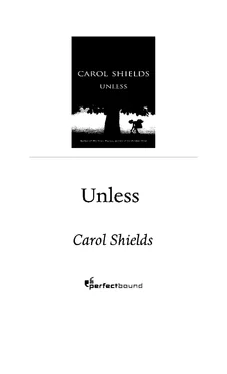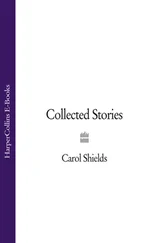Carol Shields - Unless
Здесь есть возможность читать онлайн «Carol Shields - Unless» — ознакомительный отрывок электронной книги совершенно бесплатно, а после прочтения отрывка купить полную версию. В некоторых случаях можно слушать аудио, скачать через торрент в формате fb2 и присутствует краткое содержание. Жанр: Современная проза, на английском языке. Описание произведения, (предисловие) а так же отзывы посетителей доступны на портале библиотеки ЛибКат.
- Название:Unless
- Автор:
- Жанр:
- Год:неизвестен
- ISBN:нет данных
- Рейтинг книги:4 / 5. Голосов: 1
-
Избранное:Добавить в избранное
- Отзывы:
-
Ваша оценка:
- 80
- 1
- 2
- 3
- 4
- 5
Unless: краткое содержание, описание и аннотация
Предлагаем к чтению аннотацию, описание, краткое содержание или предисловие (зависит от того, что написал сам автор книги «Unless»). Если вы не нашли необходимую информацию о книге — напишите в комментариях, мы постараемся отыскать её.
Unless — читать онлайн ознакомительный отрывок
Ниже представлен текст книги, разбитый по страницам. Система сохранения места последней прочитанной страницы, позволяет с удобством читать онлайн бесплатно книгу «Unless», без необходимости каждый раз заново искать на чём Вы остановились. Поставьте закладку, и сможете в любой момент перейти на страницу, на которой закончили чтение.
Интервал:
Закладка:
Tom serves himself last. His hands are shaking. When did that start? Thank God for Chris, thank God for Natalie, for their inane high-school gossip, their naive willingness to lunge forward and expand on tiny particulars of the quotidian, Mr. Glaven who was spotted in Toronto in a gay bar over the weekend, holding hands with another man, kissing him on the lips. “Oh no, not on the lips!” From Chris. They strained to compensate for Norah’s absence, keeping up the volubility quotient but without quite catching Norah’s murmuring reflectiveness or her perfectly judged pause when she is asked a question. “Don’t forget the salad,” I reminded them, and this was my only real contribution to the dinner conversation, a reflex embedded in my role as mother, the provider of nutrition, the server of balanced meals.
I was thinking about Alicia in my novel who has gone on a no-carb diet so she can fit into the size-eight wedding dress she has ordered. What a vapid woman she is. What does Roman see in her really? Such fatal vanity, such a lack of suffering — either that or the suffering hasn’t quite reached her. It’s got blocked in her marrow, it never moves from her flesh up into her brain stem.
Suddenly it was clear to me. Alicia’s marriage to Roman must be postponed. Now I understood where the novel is headed. She is not meant to be partnered. Her singleness in the world is her paradise, it has been all along, and she came close to sacrificing it, or, rather, I, as novelist, had been about to snatch it away from her. The wedding guests will have to be alerted and the gifts returned. All of them, Alicia, Roman, their families, their friends — stupid, stupid. The novel, if it is to survive, must be redrafted. Alicia will advance in her self-understanding, and the pages will expand. I’ll start over tomorrow. This thought pulsed in my throat. Tomorrow.
The telephone rang at that moment. A call from New York and the news that my editor, Mr. Scribano, had died during the afternoon.
Next
Dear Mr. Scribano died in hospital, after a fall down the stairs the previous day. The small private funeral will be held in three days and there is to be a special tribute in next week’s New York Times Book Review. Someone from the paper phoned me at home in Orangetown and asked how I had found him as an editor.
I was not composed and certainly not eloquent. I explained: Mr. Scribano had been Danielle’s editor, and Danielle had directed me toward him with my first novel. This had been fortunate for me, being handed une courte échelle, and publishing my first novel in my forties. How had I found him to work with? We met only twice; talked on the telephone perhaps a dozen times; corresponded occasionally, erratically. I signed a contract in his presence, in his large, sparsely furnished, over-bright office on the sixty-second floor in the middle of Manhattan. He had apologized for not taking me to lunch, something publishers were expected to do, but he was a man whose habit was to have a sandwich sent up from the ground-floor deli at twelve sharp. It was noon now. Would such a common everyday sandwich do for me? Yes, I had said, and in a few minutes we were munching our way through dense rye bread, cheese, and lettuce. He ate with daintiness, was careful about the crumbs getting into his moustache, and sipped his hot tea searchingly. His laughter was short, deep, and unforced, and I could see that he might be attractive to women. I sat on a little chair. He sat in his big father bear chair.
Much later, he raised the subject of writing a second novel, a sequel, though I remember he did not use that word, and now he was suddenly dead. “I admired him greatly,” I heard myself saying into the phone, and then, incomprehensibly, “I had no idea.”
Tom says that people who fall down stairs don’t usually die. They get themselves covered with bruises and sometimes they break their arms or legs. Death occurs only if the head strikes something hard with a particular force or angle, and all day I’ve been thinking of how he might be alive this minute if only — if only he hadn’t pitched forward so helplessly, if only he hadn’t insisted on bare uncarpeted stairs, if only his head hadn’t banged on the large chunk of granite he kept on the landing, a souvenir from a lecture tour in Italy back in the fifties.
He died within hours without suffering, his secretary, Adrienne, said, phoning to give a full report, as though this information was owed to me as one of the firm’s listed novelists.
Yes, she said, all the Scribano & Lawrence authors were to be personally contacted and informed of the death, just as Mr. Scribano would have wished. All the variables had been in place, Adrienne said: disorientation on the dark stairway, the headlong fall, the stony weapon waiting. He was probably going down to the kitchen to make tea, some herbal potion to help him sleep.
But I didn’t know he was troubled, that he lived alone, that he’d ever lectured in Italy, that he had sleep problems; I didn’t even know how old he was, but I was told, and later I read it in his obituary. He was seventy-seven. His death should not have come as the shock it did. It seemed to me, when I first got the news, that I would not be continuing the novel, that Mr.
Scribano alone had instigated the project and kept it alive. (I did know that there was no Mr.
Lawrence, that he had died decades ago, that his name was kept for the sake of euphony.) The news about Mr. Scribano was worse for Danielle Westerman, who has known him for more than forty years and who has led me to believe that he was not only her editor but, for a brief period in the early sixties, a lover. She calls him by his first name, Andreas. She took the news badly. A good many of her friends have died in the last year or two. For one’s editor to die, she told me over the phone, is to understand what an artifice writing really is. “Without editors, writers are nothing but makers of lace.”
I didn’t agree with this notion, not for a moment, but lacked the energy for a quarrel. If the truth were known, worry over Norah took so much of my concern that it was hard to feel genuine sorrow over the death of a seventy-seven-year-old man who had died in a rather careless manner. My grief for Mr. Scribano was cut short, a modest mourning; it was over and done with in a matter of days; I sent flowers for the funeral, which was held in St. Patrick’s Cathedral — that did impress me! — wrote a note to his secretary — he had no family — and then I forgot about him, put him out of my mind. I had only so much concentration for sadness.
Danielle seemed baffled by this hierarchy of concerns or what she perceived as my hardness of heart. “Such a grand life. Such a presence. So great a contribution. It will be impossible to replace such a person.”
Yes, I said, but he had a long life. What I meant was: he had more than Norah is going to get.
Early November — I hate this time of year. Dark mornings, broken jack-o’-lanterns on the roadway. Winter’s harder, I keep thinking, but harder than what? Snow flurries in the headlights. The trees, all bare, divide the sky into segments. A short, sunless Wednesday, the air stretched out on every side like sheets of muslin.
On Wednesdays I drive to Toronto. This is not as easy as it sounds. I have been awake since six o’clock. Shower, dress, twist my hair back. I’ve wakened Chris and Natalie and alerted Tom to a spot on his sweater. Breakfast: coffee for Tom and me and tea for the girls.
Toast, butter, jam. Crumbs around the toaster. Plates and cups in the dishwasher. Urge girls to hurry so they won’t miss the school bus. Natalie hasn’t eaten a thing, how long can she live on milky tea? Hug girls. Wish them luck on whatever: math quiz, chem lab, basketball.
Читать дальшеИнтервал:
Закладка:
Похожие книги на «Unless»
Представляем Вашему вниманию похожие книги на «Unless» списком для выбора. Мы отобрали схожую по названию и смыслу литературу в надежде предоставить читателям больше вариантов отыскать новые, интересные, ещё непрочитанные произведения.
Обсуждение, отзывы о книге «Unless» и просто собственные мнения читателей. Оставьте ваши комментарии, напишите, что Вы думаете о произведении, его смысле или главных героях. Укажите что конкретно понравилось, а что нет, и почему Вы так считаете.












